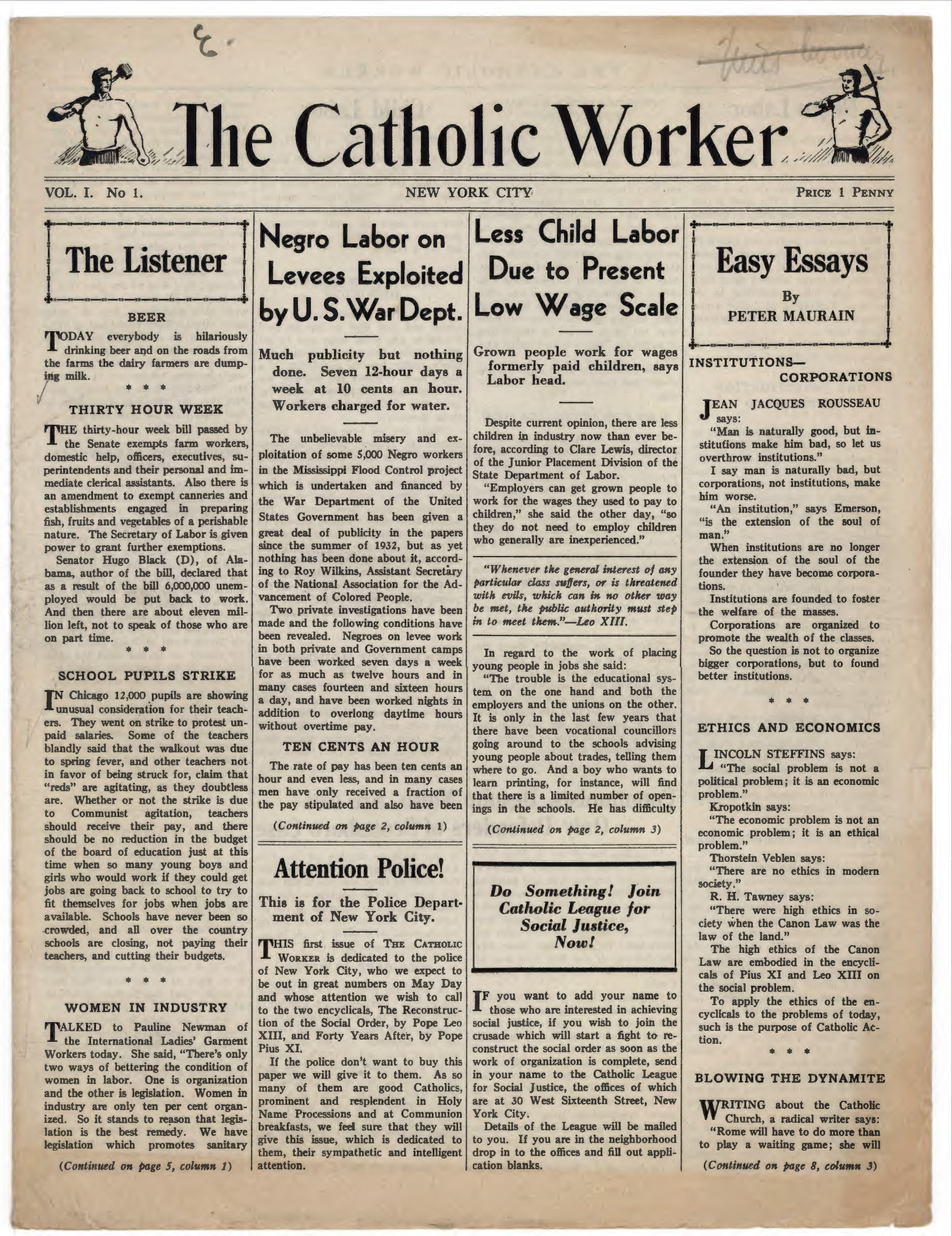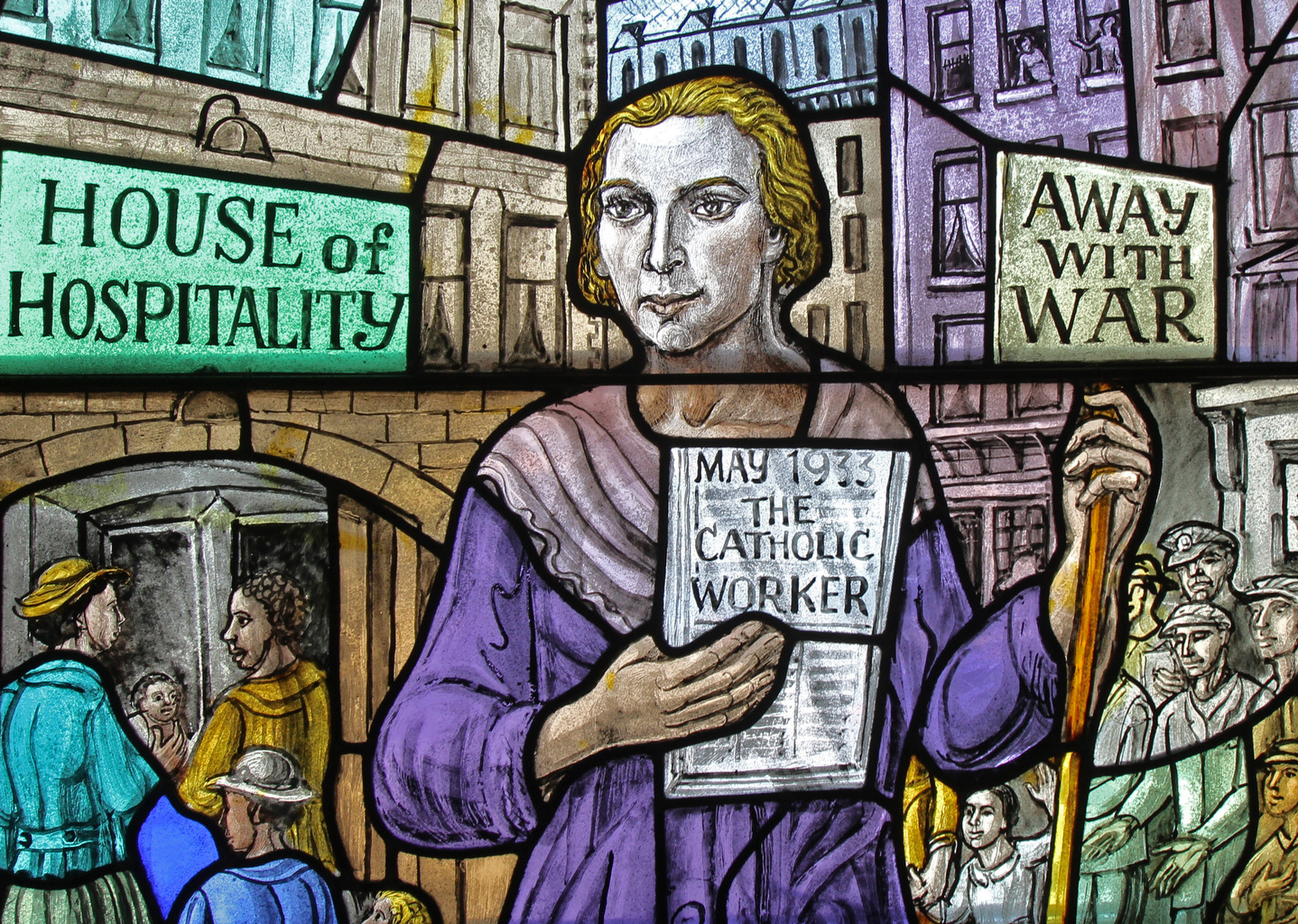The Catholic Worker movement is a unique blend of faith, social justice, and community service that has significantly impacted the lives of many across the globe. Founded in 1933 by Dorothy Day and Peter Maurin, the Catholic Worker movement seeks to promote a lifestyle that embodies the teachings of Jesus Christ through acts of love and service to the marginalized. This article will explore the origins of the Catholic Worker, its core principles, and its enduring legacy in advocating for the poor and oppressed.
Throughout its history, the Catholic Worker movement has provided a voice for those who are often unheard, standing firmly against war, poverty, and social inequality. It has inspired countless individuals and organizations to engage in acts of service, promoting a vision of a more just and compassionate world. This article will delve into the essential aspects of the Catholic Worker movement, including its foundational philosophy, the various initiatives it has launched, and the impact it continues to have on society today.
As we unpack the significance of the Catholic Worker movement, we will also highlight the importance of community, hospitality, and direct action in fostering a culture of love and solidarity. By understanding the principles that guide the Catholic Worker, readers will gain insight into how they can participate in this transformative movement and contribute to the pursuit of justice and peace in their own lives.
Table of Contents
History of the Catholic Worker Movement
The Catholic Worker movement was born out of the social and economic turmoil of the early 20th century. During the Great Depression, many individuals were struggling to survive, and the Catholic Church was called to respond to the urgent needs of the poor. Dorothy Day, a prominent journalist and social activist, and Peter Maurin, a French Catholic philosopher, joined forces to create a new model of social service based on the teachings of the Church.
In 1933, they published the first issue of the Catholic Worker newspaper, which aimed to inform and inspire readers about social justice issues, including poverty, war, and the labor movement. This publication laid the groundwork for a broader movement that would encompass houses of hospitality, farming communities, and various social justice initiatives.
Over the decades, the Catholic Worker movement has spread across the United States and around the world, establishing numerous houses of hospitality and engaging in direct action to address the systemic issues faced by marginalized communities.
Core Principles of the Catholic Worker
1. Hospitality
At the heart of the Catholic Worker movement is the principle of hospitality. This involves offering shelter, food, and companionship to those in need, regardless of their background or beliefs. Houses of hospitality serve as safe havens for the homeless, the hungry, and the marginalized, embodying the call to love and serve one another.
2. Nonviolence
The Catholic Worker firmly believes in the power of nonviolence as a means of pursuing social change. In the spirit of Jesus Christ, advocates of the movement emphasize peaceful resistance to war, oppression, and injustice, promoting dialogue and understanding as pathways to resolution.
3. Solidarity with the Poor
The movement calls for a deep solidarity with the poor and marginalized, recognizing their dignity and worth as human beings. This principle encourages individuals to engage in acts of advocacy and support for those who are often left behind in society.
4. Simple Living
Members of the Catholic Worker movement are encouraged to adopt a lifestyle of simplicity, rejecting materialism and consumerism. This emphasis on simple living fosters a deeper connection to community and promotes a more equitable distribution of resources.
Key Initiatives and Projects
The Catholic Worker movement has launched numerous initiatives aimed at addressing social injustice and providing assistance to those in need. Some of the most notable projects include:
- Houses of Hospitality: These homes provide shelter, food, and support to individuals experiencing homelessness or poverty.
- Farm Communities: These initiatives promote sustainable agriculture and self-sufficiency, offering a space for individuals to work and live in community.
- Advocacy and Direct Action: The movement engages in protests, demonstrations, and other forms of activism to raise awareness of social justice issues.
- Educational Programs: Many Catholic Worker communities offer workshops, discussions, and events to educate the public about issues related to poverty, war, and social justice.
Impact on Society and Communities
The impact of the Catholic Worker movement can be seen in the lives of those it serves and the broader society. By prioritizing hospitality and solidarity, the movement has created spaces where individuals feel valued and supported. Many former residents of houses of hospitality have gone on to lead lives of service and activism, further amplifying the message of the Catholic Worker.
Additionally, the movement has inspired countless individuals to engage in social justice work and has influenced various organizations and initiatives focused on poverty alleviation, peacebuilding, and community development.
Statistical data show that communities with active Catholic Worker involvement tend to experience lower rates of homelessness and increased social cohesion, highlighting the movement's effectiveness in addressing systemic issues.
Dorothy Day: A Profile in Faith
Dorothy Day was a key figure in the Catholic Worker movement and is often regarded as a saintly figure for her unwavering commitment to social justice. Born on November 8, 1897, in Brooklyn, New York, Day's early life was marked by a deep sense of social responsibility and a desire for justice.
Throughout her life, Dorothy Day worked tirelessly to advocate for the rights of the poor and marginalized. She co-founded the Catholic Worker movement in 1933 and dedicated her life to serving those in need until her death on November 29, 1980.
Personal Data and Biography
| Name | Dorothy Day |
|---|---|
| Date of Birth | November 8, 1897 |
| Date of Death | November 29, 1980 |
| Occupation | Journalist, Social Activist, Co-founder of the Catholic Worker |
The Future of the Catholic Worker Movement
As the world continues to grapple with issues of poverty, war, and social inequality, the Catholic Worker movement remains relevant and vital. New generations of activists are being inspired by the principles of hospitality, nonviolence, and solidarity, ensuring that the legacy of Dorothy Day and Peter Maurin lives on.
Future initiatives will likely focus on addressing contemporary challenges, such as climate change, systemic racism, and economic inequality, while remaining rooted in the core values of the movement.
Conclusion and Call to Action
In conclusion, the Catholic Worker movement is a powerful testament to the impact of faith in action. Through its commitment to hospitality, nonviolence, and solidarity with the poor, the movement has transformed countless lives and communities. As we reflect on the principles and legacy of the Catholic Worker, we invite readers to consider how they can engage in acts of service and advocacy in their own lives.
We encourage you to leave a comment, share this article, or explore other resources related to the Catholic Worker movement. Together, we can work towards a more just and compassionate world.
Thank you for visiting our site, and we hope to see you again soon!
Also Read
Article Recommendations



ncG1vNJzZmivp6x7tMHRr6CvmZynsrS71KuanqtemLyue9KtmKtlpJ64tbvKcWacmaSdvK21wmauqKqbmr9vtNOmow%3D%3D